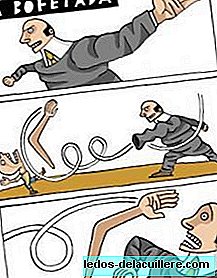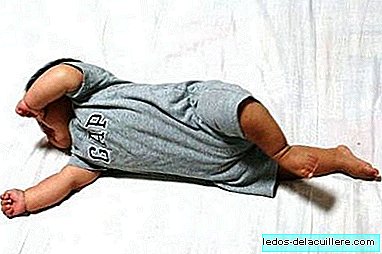A few days ago we talked with the psychologist and professor Marino Pérez about ADHD (Attention Deficit Hyperactivity Disorder), a disease that in his opinion does not exist, and that in his opinion, the diagnosis and pharmacological treatment could negatively affect children , both in the short and medium term.
On the other hand, for Dr. José Ángel Alda, section head of child and youth psychiatry at the Sant Joan de Déu Hospital in Barcelona and coordinator of the ADHD Unit, this disorder Not only it is real but to ignore it and not treat it, it could lead to serious problems for the child. In our eagerness to offer the most complete information possible, today we interview Doctor Alda to learn more about ADHD.
Why the increase in ADHD diagnoses?
It is true that more and more is diagnosed in our consultations, however the numbers of patients diagnosed are similar to countries around us. In my opinion, The increase in diagnosis is due to the increased training and sensitivity of teachers and pediatricians in detecting these problems.
What signs warn of the existence of this disorder?
The main alarm signals would be:
Low school performance in relation to their abilities
Children who get lost easily
Children who forget things frequently
Impulsive character, that is, do not think things before doing them ^
Very busy children in class, at home or in any other situation

Why do you think there are professionals who claim that ADHD does not exist?
There is a small group that denies the existence of the disorder, but we are facing a pathology described more than 100 years ago and of which more than 2,000 articles are published every year in scientific journals.
We know more and more about ADHD. Thanks to neuroimaging tests, it has been possible to demonstrate differences in brain functioning in these patients in relation to subjects without the disease.
How is a child treated with ADHD and what prognosis do you have?
The treatment recommended by the main Clinical Practice Guidelines is multimodal, which includes:
psychopedagogical approach,
psychological treatment,
and in moderate and severe cases the pharmacological treatment is added.
However, by various studies we know that around 50-60% of children diagnosed with ADHD symptoms persist in adolescence and adulthood, although in a different way.
What would happen if a child with ADHD is not diagnosed correctly?
It depends mainly on the severity of the symptoms, but if it is not treated correctly these situations could occur:
School failure,
Leaving studies early,
Educational level lower than their intellectual abilities,
Greater propensity to suffer accidents,
Greater propensity for early drug use and more difficult to get them to abandon their use,
Higher rate of unwanted pregnancies and suffering from sexually transmitted diseases,
More difficulties when it comes to finding work and it is also frequent that they have more problems in their work environment
Why is it sometimes so complex to diagnose ADHD?
Because it depends on the experience and knowledge that the professional has about ADHD, since at the moment we don't have any diagnostic or prognostic markers, the diagnosis being exclusively clinical.
 "The diagnosis is based on interviews with parents and the patient, obtaining information from the school and supporting us in questionnaires that we passed in the consultation"
"The diagnosis is based on interviews with parents and the patient, obtaining information from the school and supporting us in questionnaires that we passed in the consultation"Symptoms of lack of attention or hyperactivity may be present in other developmental disorders, or they may occur along with other pathologies such as anxiety, depression or behavioral problems.
Therefore, in some cases the diagnosis is not easy. My advice would be that if you suspect an ADHD, parents go to professionals with extensive experience in this kind of problems.
More information about ADHD
In Babies and More we have treated the issue of ADHD on several occasions from different points of view. You can read more information in the following links:
"Now what worries and is not tolerated is the restless and outgoing child": the psychologist Marino Pérez dismantles ADHD
A mother whose daughter suffers from ADHD reminds us why we shouldn't judge other moms
They show that ADHD is not a behavioral disorder, but an insufficient maturation of the brain
Is ADHD overdiagnosed?
"Our children have a devastating emotional state": the text that goes viral and is right
School and ADHD, Other visions and alternatives to ADHD treatment
Why in France there are hardly any children with ADHD
The psychiatrist who "discovered" ADHD confessed before dying that "it is a fictitious disease"
"Many children only show ADHD at school." Interview with the psychologist Cristina Silvente
"If the Educational System changed there would be fewer diagnoses of ADHD." Interview with psychologist Liliana Castro
"Psychiatrists argue that they are the only ones who can diagnose ADHD." Interview with psychologist Antonio Ortuño
Overdiagnosis of ADHD can put children's health at risk
Manifestations of ADHD in young children
Is Attention Deficit Hyperactivity Disorder a disease?
"Early intervention is essential to alleviate possible cognitive deficits or even correct them." Interview with Marina Barber, psychologist
Does my child have Attention Deficit Hyperactivity Disorder?
Signs of hyperactivity in the child
IStock photos
Interview with Dr. José Ángel Alda, Head of the Child and Youth Psychiatry Section of the Sant Joan de Déu Hospital in Barcelona. Coordinator of the ADHD Unit of the Sant Joan Hospital in Barcelona.












